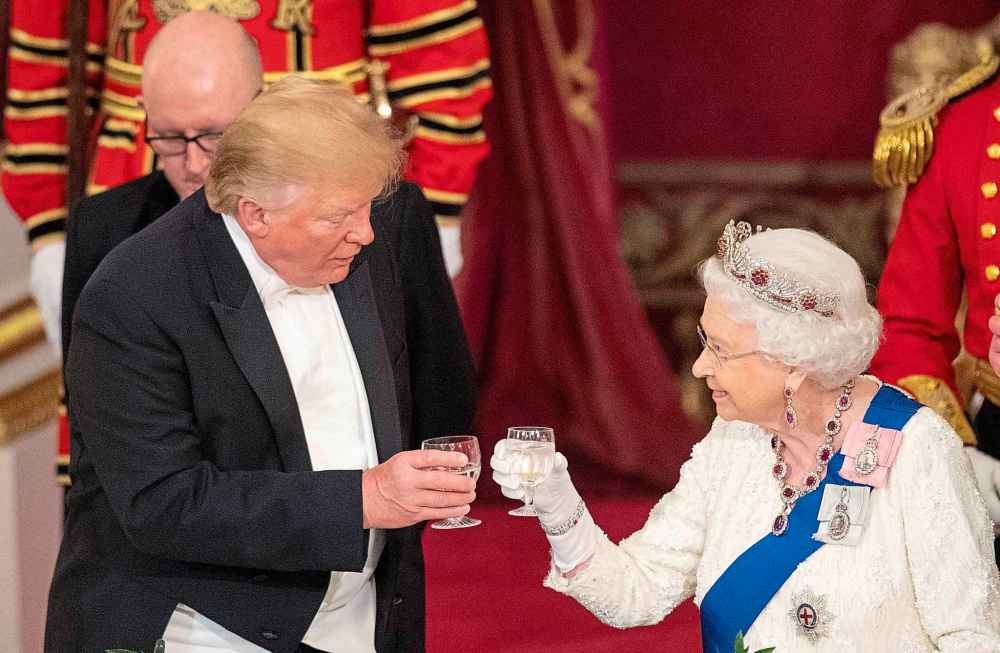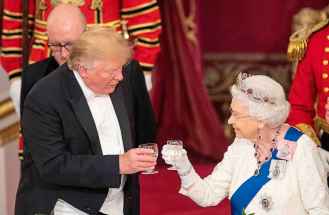Britain reluctantly charms Trump
Read this article for free:
or
Already have an account? Log in here »
To continue reading, please subscribe:
Monthly Digital Subscription
$0 for the first 4 weeks*
- Enjoy unlimited reading on winnipegfreepress.com
- Read the E-Edition, our digital replica newspaper
- Access News Break, our award-winning app
- Play interactive puzzles
*No charge for 4 weeks then price increases to the regular rate of $19.00 plus GST every four weeks. Offer available to new and qualified returning subscribers only. Cancel any time.
Monthly Digital Subscription
$4.75/week*
- Enjoy unlimited reading on winnipegfreepress.com
- Read the E-Edition, our digital replica newspaper
- Access News Break, our award-winning app
- Play interactive puzzles
*Billed as $19 plus GST every four weeks. Cancel any time.
To continue reading, please subscribe:
Add Free Press access to your Brandon Sun subscription for only an additional
$1 for the first 4 weeks*
*Your next subscription payment will increase by $1.00 and you will be charged $16.99 plus GST for four weeks. After four weeks, your payment will increase to $23.99 plus GST every four weeks.
Read unlimited articles for free today:
or
Already have an account? Log in here »
Hey there, time traveller!
This article was published 03/06/2019 (2382 days ago), so information in it may no longer be current.
British Prime Minister Theresa May this week turned on the pomp and pageantry of a state visit to flatter U.S. President Donald Trump — and he clearly loved every minute of it. Her Conservative government is trying to extract Britain from the European Union and desperately needs a trade deal with the U.S. to keep the country in business. Mr. Trump needs tokens of international respect to show to his voters ahead of next year’s presidential elections.
Britain can’t offer Mr. Trump much in the way of wealth or power, but they do pomp and pageantry very, very well. This week, they’re laying it on with a trowel. Marching soldiers, artillery salutes, lunch with the Queen, tea with the Prince of Wales.

It’s an odd kind of state visit because many Britons detest Mr. Trump. He will not visit the House of Commons, though distinguished visitors often do, because there would be angry scenes. Commons Speaker John Bercow forbade such an appearance. London Mayor Sadiq Khan, who wondered aloud why Mr. Trump was honoured with a state visit, was rewarded with an insulting Trumpian tweet immediately before the president’s arrival.
The London public, many of whom oppose the visit, were kept away from the motorcade route by which Mr. Trump travelled from the U.S. ambassador’s residence to his formal meeting with the Queen at Buckingham Palace. Jeremy Corbyn, leader of the Labour opposition, refused to attend a banquet for Mr. Trump, preferring to speak at an anti-Trump demonstration in Trafalgar Square.
It’s an odd visit also in the sense that Prime Minister May, whose plan for leaving the European Union was thrice rejected in Parliament, has announced her resignation for the end of June. Her ruling Conservative Party is in the midst of picking a new leader and prime minister. Mr. Trump is cementing his relations with a leader who has already quit. He will not meet anyone who can tell him whether or when or how Britain will leave the EU.
Is the flattery good enough to make Mr. Trump forget his love of import tariffs and his aversion to international trade? For this week, it probably is. But a week is a long time in politics and in the thought processes of Donald Trump. By the time Britain disentangles itself from Europe, there is no knowing who will be running Britain.

Canada combined a bit of flattery with assiduous campaigning within the U.S. business community in order to win a renewed trade agreement with the Trump administration. In the six months since the revised treaty was signed by Canada, Mexico and the United States, Mr. Trump has invented one pretext after another — steel and aluminum protection, fear of migrants from Mexico, possible uranium protection — to obstruct its implementation.
Judging from Canada’s experience, the charm offensive is probably a waste of effort. Once Mr. Trump is back home with his portfolio of pictures with the Queen and the other royals, he will have all he needs from Britain. He will regard Britain, as he regards the rest of the world, as just another bunch of snivellers and shysters trying to take unfair advantage of America’s wealth.
This state visit expresses Mr. Trump’s high international standing and the importance of the U.S. economy in world trade. It expresses even more clearly the pitiable state of lonely, leaderless Britain.









